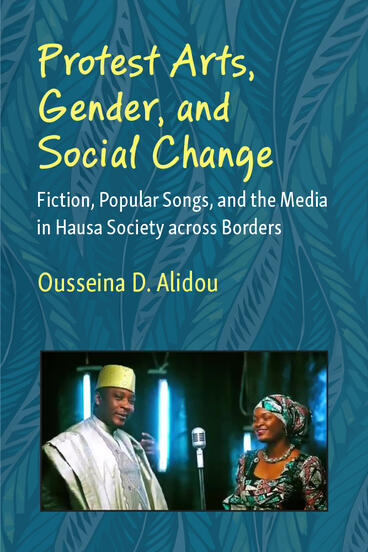Protest Arts, Gender, and Social Change
Fiction, Popular Songs, and the Media in Hausa Society across Borders
The role of literature and popular songs in the cultural politics of Hausa society
Description
Protest Arts, Gender, and Social Change: Fiction, Popular Songs, and the Media in Hausa Society across Borders by Ousseina Alidou examines how a new generation of novelists, popular songwriters, and musical performers in contemporary Hausa society are using their creative works to effect social change. This book empathizes with the reality of the forms of oppression, social isolation, and marginalization that vulnerable and underprivileged communities in contemporary Hausa society in Northern Nigeria and the Niger Republic have been experiencing from the mid-1980s to the present. It also highlights the ways in which song performances produce an intertextual dialogue between their lyrics and visual dramatic narratives to raise awareness against social ills, including gender-based violence and social inequalities exposed by biomedical health pandemics such as HIV and COVID-19. In these creative Hausa narratives, the oppressed and marginalized have agency in articulating their own experiences.
While there is an abundance of social science studies giving voice to the dominant actors of hegemonic violence in Hausa society, there is a dearth of works that center the voices of the afflicted, unprivileged, and marginalized class, among whom are women and youth. One aim of this book is to examine the ways popular songs and fiction fill up the humanistic urgency to capture the dignity of the life of those dehumanized by local, national, and international hegemonic religious and secular forces. The book focuses on the resistance narratives of one female novelist and six song composers and performers that generate alternative counterhegemonic responses to dominant patriarchal discourses produced by cultural, religious, and political elites, thus reaching out to marginalized local and national communities and global audiences. Alidou interweaves the social, political, and biomedical epidemics with the concept of “Hausa interiority” to create a unique perspective on contemporary Hausa culture and politics through the lens of artistic productions.
Ousseina D. Alidou is Distinguished Professor of Linguistics and African Studies at Rutgers University.
Reviews
“Protest Arts, Gender, and Social Change is a thoughtful exploration of the vernacular aesthetics deployed by some cultural activists in search of justice. Drawing on her considerable expertise, Alidou documents how a new generation of wordsmiths blends artistry and advocacy to discredit old orthodoxies and advance new ways of being Hausa. By tracing the production and politicization of Hausa texts, songs, and performances, this book offers a compelling portrait of popular culture as a discursive force of change.”
- Adeline Masquelier, Tulane University
“Professor Ousseina Alidou’s brilliant study of musical and textual productions by women of the Muslim Sahel invites scholars to probe deeply the texts and music women artists employ to question and disrupt patriarchy. This must-read text will stimulate classroom conversations on gender justice.”
- Elias Kifon Bongmba, Harry and Hazel Chavanne Chair in Christian Theology and Professor of Religion, Rice University

